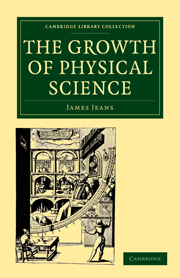Book contents
- Frontmatter
- PUBLISHERS' NOTE TO THE SECOND EDITION
- PREFACE
- Contents
- PLATES
- I THE REMOTE BEGINNINGS
- II IONIA AND EARLY GREECE
- III SCIENCE IN ALEXANDRIA
- IV SCIENCE IN THE DARK AGES
- V THE BIRTH OF MODERN SCIENCE
- VI THE CENTURY OF GENIUS
- VII THE TWO CENTURIES AFTER NEWTON
- VIII THE ERA OF MODERN PHYSICS
- Index
- Plate section
III - SCIENCE IN ALEXANDRIA
Published online by Cambridge University Press: 07 September 2010
- Frontmatter
- PUBLISHERS' NOTE TO THE SECOND EDITION
- PREFACE
- Contents
- PLATES
- I THE REMOTE BEGINNINGS
- II IONIA AND EARLY GREECE
- III SCIENCE IN ALEXANDRIA
- IV SCIENCE IN THE DARK AGES
- V THE BIRTH OF MODERN SCIENCE
- VI THE CENTURY OF GENIUS
- VII THE TWO CENTURIES AFTER NEWTON
- VIII THE ERA OF MODERN PHYSICS
- Index
- Plate section
Summary
The three centuries we have just had under discussion formed a sort of intellectual ‘golden age’ in which science made more progress than in three millennia of Babylon and Egypt. But as this period approached its end, a change set in, and by the middle of the fourth century b.c., Greek culture had definitely begun to decline, and Greek science with it. A few years later, the decline was accelerated by the invasion and military conquest of the country by Alexander the Great. Yet events which seemed to be disastrous to science at the time may perhaps have been a piece of good fortune in disguise.
For Alexander now decided to celebrate his victories and consolidate his empire by building a new capital which was to be the most magnificent city in the world. He chose a site on the flat lands where the Nile ran into the sea, and called the still unborn city Alexandria, after himself.
He died in 323 b.c., his grandiose scheme still incomplete, and his kingdom was divided among all who could lay hands on a piece of it. Egypt fell to the lot of one of his generals, Ptolemy, who chose the still unfinished Alexandria as his capital and, more ambitious even than Alexander, aspired to make it the world's capital not only for government and commerce but for culture and intellect as well.
- Type
- Chapter
- Information
- The Growth of Physical Science , pp. 69 - 101Publisher: Cambridge University PressPrint publication year: 2009First published in: 1947



